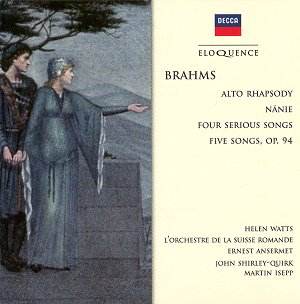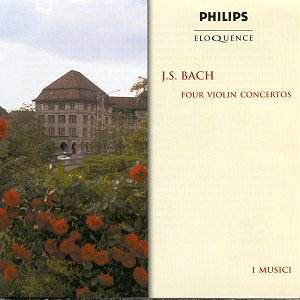 Composer: Johannes Brahms
Composer: Johannes Brahms
Works: Alto Rhapsody Op. 53, Nanie Op. 82, Four Serious Songs Op. 121, Five Songs Op. 94
Performers: Helen Watts, contralto; John Shirley-Quirk, baritone; Martin Isepp, piano; Choirs of Suisse Romande and Pro Arte de Lausanne; Orchestre de la Suisse Romande conducted by Ernest Ansermet
Recording: Recorded 1967 (Alto Rhapsody, Nanie); 1971 (Four Serious Songs, Five Songs)
Label: DECCA ELOQUENCE 461 245-2
Brahms’s music often evokes a rich tapestry of human emotion, oscillating between grandeur and introspection. The selected works in this compilation, particularly the Alto Rhapsody and Nanie, offer poignant reflections on love, loss, and mortality, underscoring Brahms’s capacity for lyrical depth and emotional gravity. The Alto Rhapsody, set to a text by Goethe, exemplifies his ability to blend vocal lyricism with orchestral color, resulting in a profound exploration of the human condition. Similarly, Nanie, a tribute to the theme of mourning, captures the essence of Brahms’s mature style, characterized by its somber yet noble character.
Helen Watts’s contralto shines in the Alto Rhapsody, embodying the work’s complex emotional landscape with a voice that balances technical prowess and expressive warmth. Her interpretation is marked by an impressive command of dynamics, particularly in her nuanced phrasing during the climactic moments. Watts navigates the intricate interplay between voice and orchestra with a sophisticated understanding of Brahms’s intentions, delivering a performance that feels both intimate and expansive. Ansermet’s conducting complements her artistry; he draws forth a lush orchestral sound that, while occasionally veering towards a metallic edge in the strings, remains compellingly rich. Particularly noteworthy is the way he shapes the orchestral textures, allowing the vocal lines to soar above the ensemble without feeling overshadowed.
John Shirley-Quirk’s contributions in the Four Serious Songs and Five Songs further enrich this collection. His baritone voice possesses a distinctive timbre, and in Ich wandte mich, he employs a delicate half-voice that imbues the music with an ethereal quality, effectively conveying the introspective nature of the text. His interpretation eschews mere declamation; rather, it seeks to engage the listener on an emotional level, exemplified in O Tod, wie bitter bist du, where his clear diction and fluid phrasing resonate with poignant sincerity. The partnership with pianist Martin Isepp is marked by a seamless collaboration that enhances the lyrical qualities of Brahms’s songs, with Isepp providing a sensitive and supportive backdrop.
The engineering of this recording merits attention as well. Despite the passage of time since its original release, the clarity and presence of the performances have held up remarkably well. The balance between the singers and the orchestra allows for a dynamic range that captures the subtleties of Brahms’s writing, although there are moments where the orchestral textures could have benefitted from a warmer sonic palette. The recording retains a sense of immediacy, inviting listeners to engage with the emotional depth of the music.
Compiling these performances in a single anthology serves not merely as a nostalgic revisitation but as an important reminder of the interpretative richness these works can convey. The sustained excellence in both technical execution and interpretive insight makes this release a noteworthy addition to any collection. Watts and Shirley-Quirk each bring their own unique perspectives to Brahms’s music, resulting in a cohesive yet varied exploration of the composer’s vocal works. The mastery displayed by both artists, alongside Ansermet’s thoughtful direction, solidifies this recording as a compelling testament to the enduring power of Brahms’s music.



